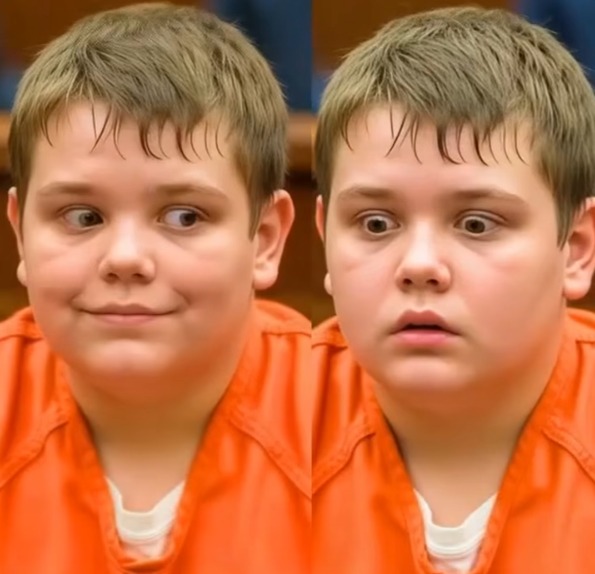Cedar Falls woke up that Tuesday thinking the biggest excitement would be the new pumpkin-spice latte at the corner café. By sunset, the whole place was chewing on the story of a twelve-year-old boy whose grin looked more like a dare than an apology. Ethan Morales should have been diagramming sentences in Mrs. Taylor’s class; instead he was perched on a hard bench in Courtroom 3B, sneakers dangling, that tiny curl at the corner of his mouth making the front page before supper.
Three weeks earlier, Ethan and two older kids had slipped through an unlocked window on Maple Street. They thought the house was empty, a quick grab-and-go. But Harold Kensington—retired teacher, collector of antique rocks, and the kind of man who kept every homework he ever graded—was home. When he stepped into the hallway in his slippers, the night exploded into shouting and running and, finally, a chunk of polished stone flying through the air. It caught Harold above the eye and dropped him like a puppet. The boys bolted. Harold lived, but the bruise on his face bloomed into a purple map that the whole town studied in horror. People wanted to know how a kid could swing so hard and still look like he was winning.
Inside the courtroom, Ethan’s smirk stayed put while the judge read the charges. His mother cried into crumpled tissues; his lawyer shuffled papers. When Judge Weller asked if he had anything to say to Harold, Ethan shrugged and mumbled, “He shouldn’t have blocked the door.” The words skittered across the polished wood like marbles on glass. Gasps, head-shakes, camera flashes. The gavel fell: six months locked up. For the first time, the smile slipped, replaced by something closer to surprise, as if punishment had been the one adult move he hadn’t rehearsed.
The Cedar Valley Juvenile Detention Center smelled like bleach and cafeteria toast. Days were colorless blocks: wake, eat, class, sweep, group, lights-out. Ethan kept his head down and his attitude sharp enough to cut anyone who came close. Then Marcus—fifteen, calm, doing time for stealing bikes—sat beside him at dinner and said, “You can keep fronting, but the only person stuck with you forever is you.” The sentence landed soft and stayed heavy. That night Ethan stared at the ceiling and felt the smirk he’d worn like armor begin to rust around the edges.
Mrs. Campbell, the English teacher, handed out thin blue notebooks. “Write what you’re scared to say out loud,” she told them. Ethan doodled corners for a week, then wrote one line: “I didn’t mean for the rock to hit him.” The next day he filled a page. Soon the notebook sagged with ink about moms who work double shifts, dads who vanished, and the moment Harold’s knees buckled. The final assignment: a letter to the person you hurt. Ethan’s pen shook, but the words arrived anyway—clumsy, honest, naked. He mailed it before he could change his mind and felt something inside him unclench, like a fist deciding to try life as an open hand.
Six months later he stood in the same courtroom, shoes still not touching the floor, but this time his voice didn’t hide. “That smirk was just scarecrow stuffing,” he told Judge Weller. “I’m throwing it out.” She studied him the way gardeners study spring soil, looking for green shoots. Probation, community hours, strict curfew. He nodded so hard his neck hurt. Outside the doors, cameras waited, but the headlines would have to find a new adjective; “defiant” no longer fit.
Freedom tasted like cold bus exhaust and McDonald’s fries. Not everyone wanted him back: some neighbors crossed the street, some cashiers suddenly found counters fascinating. Ethan wore their stares like wet clothes—uncomfortable, but shrinking with every step. He stocked shelves at the food bank, tutored younger kids in math, and kept writing. One story, “The Smirk,” landed in the local paper. People wrote letters—some angry, some grateful—and Ethan learned that words could echo farther than stones.
A year later, at the town harvest dinner, he ladled mashed potatoes under string lights and looked up to find Harold Kensington in line. The old man’s left eyebrow still carried a faint scar. Ethan’s spoon wobbled. “Mr. Kensington, I’m sorry,” he said, voice small but steady. Harold held his gaze long enough to measure the change. “Don’t waste the lesson, kid,” he answered, taking the plate. They didn’t hug; they didn’t need to. The conversation lived in the quiet space between gravy and second helpings, and both walked away lighter.
Two autumns after the rock flew, the middle-school gym filled with parents clutching balloons and phones. Ethan, fourteen now, walked across the stage to give the student address. Harold sat three rows back, clapping the way teachers do—measured, proud, hopeful. Ethan looked out at the crowd, took a breath that felt bigger than his whole body, and spoke: “I was the boy who made Cedar Falls flinch. Today I’m the kid who makes it believe in second drafts.” The applause rose like wind through cornfields, warm and rustling. No smirk, no mask—just a calm smile that knew how much work still waited beyond the gym doors. Outside, the same October air drifted over Maple Street, past Harold’s repaired window, through a town learning that a single bad moment can shrink beside a thousand small comebacks—if you let the story keep writing itself.


